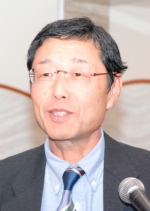December 13, 2011
The 120th
"Science and the Way of Living"─Encouragement of Open Systems Science
December 13, 2011 at Tosho Sky Room, Tokyo Chamber of Commerce and Industry
"Science and the Way of Living"─Encouragement of Open Systems Science
December 13, 2011 at Tosho Sky Room, Tokyo Chamber of Commerce and Industry
Modern science thinking, as represented by Cartesian reductionism, isolates a given problem from the real world, breaks it down into multiple, stationary problem domains for analysis, and then synthesizes those domains for a solution. This approach has solved many issues in the 20th century, but is not suitable to address problems like global warming and information systems security, for these are the problems of a very complicated, integrated system that is ever changing. So I propose the Open Systems Science approach which incorporates the temporal factor Management to the conventional Analysis and Synthesis equation. Although a problem is still perceived as multiple domains, these domains or the problem model itself can be modified dynamically as reality changes. This difference not only makes more precise future predictions, but also places problem-solving closer to consensus in society. In other words, science comes closer to our way of living (how ordinary people cope with problems) and coexists with the traditional "science as profession" (how experts cope with problems).
Dr. Mario Tokoro
Chairman and Chief Executive Officer,Sony Computer Science Laboratories, Inc.
Chairman and Chief Executive Officer,Sony Computer Science Laboratories, Inc.
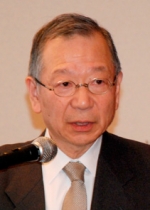
September 12, 2011
The 119th
"Japan's Scitech Diplomacy"
September 12, 2011 at Tokyo Kaikan
"Japan's Scitech Diplomacy"
September 12, 2011 at Tokyo Kaikan
Postwar Japan began its economic recovery by adopting Western technologies, this time mostly from the United States. Already a developed country, Japan today still tends to enter science and technology agreements with other developed countries. But as emerging powers like China rise, things are increasingly determined on an association or sector-to-sector basis, rather than between two countries. Accordingly Japan's science and technology diplomacy needs to focus more on emerging countries, taking these trends into account. From this perspective, the government's Japan Science and Technology Agency in association with JICA has used part of the ODA budget to start a collaborative research program, Science and Technology Research Partnership for Sustainable Development (SATREPS), targeting global issues. Currently a number of SATREPS teams, based on preliminary study on what is needed in particular areas in Asia and Africa, are involved in local R&D activities. These efforts should not be restricted to unilateral transfer of knowledge from Japan. Japan should unhesitatingly embrace locally-adopted new technology. By encouraging often, inward-looking Japanese researchers to look overseas, we want to make the most of the power of science and technology as an integral part of Japanese diplomacy.
Dr. Taizo Yakushiji
Director, Institute for International Policy Studies
Director, Institute for International Policy Studies
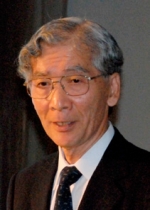
July 05, 2011
The 118th
"Great East Japan Earthquake"─Building New Technology Paradigm in Memory of Loved Ones
July 5, 2011 at Tokyo Kaikan
"Great East Japan Earthquake"─Building New Technology Paradigm in Memory of Loved Ones
July 5, 2011 at Tokyo Kaikan
In Japan people use more and more of eco-friendly products with the world's top-level eco-consciousness, yet the country's CO2 emission increases. This is probably because such consciousness tends to be an excuse to sell more merchandise. But the experience of the 2011 Great East Japan Earthquake urged people to rethink their techno-centered, consumptive lifestyles and face energy and other global environment issues. So long as future lifestyles are deduced from today's standards ("forecasting" approach), we'd all hit the wall. Rather, we'd better envision a desirable future with taking into account the finite nature of natural resources and irreversibility of the acquired living standards. Through this attitude, we should work backwards to identify what technology is really necessary or needs to be revised to connect the future to the present ("backcasting approach"). It is high time to create a new paradigm of technology, humbly learning from nature that is perfectly recycling and works in just proportion. I hope we will not just recover from disaster, but reconstruct our ways of living. My dream is to build a recycling society that the rest of the world would model after, where technology helps ordinary people exercise their ingenuity in closer ties with others and nature.
Dr. Emile Hideki Ishida
Professor, Graduate School of Environmental Studies, Tohoku University
Professor, Graduate School of Environmental Studies, Tohoku University
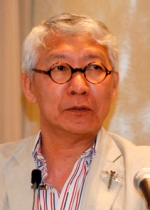
March 28, 2011
The 117th
"Future Direction of Japan's Science and Technology" ─Policy as Outlined in the Fourth Basic Plan
March 28, 2011 at Tokyo Kaikan
"Future Direction of Japan's Science and Technology" ─Policy as Outlined in the Fourth Basic Plan
March 28, 2011 at Tokyo Kaikan
The 21st century is the Asian Century with Asia having two-thirds the world population to boast over half of the world GDP by 2020. Globally sustainable economic growth is threatened by environment, energy and resources issues as the 40-billion developing world wants to be as rich as the developed nations. To combat the situation, Dr. Aizawa argued, it's important to take "problem-solving innovation" approaches from a global standpoint, including the reform of the existing social system into a flat and open one. Under the new basic plan, Japan aims not only to lead Asia with her advanced green technologies, but to rebuild her social system into a model of aging society with fewer children. With an increasing number of Nobel Prize winning scientists and breakthrough technologies, Japan still needs more investments in producing world-class leaders capable of going with the international flow of talent and capital, as well as bolstering the basic research base from the long-term perspective.
Dr. Masuo Aizawa
Executive member, Council for Science and Technology Policy, Cabinet Office
Executive member, Council for Science and Technology Policy, Cabinet Office
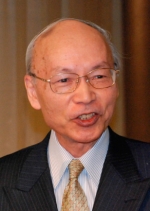
January 25, 2011
The 116th
"History of Earth and Human Civilization"
January 25, 2011 at Tokyo Kaikan
"History of Earth and Human Civilization"
January 25, 2011 at Tokyo Kaikan
According to Dr. Matsui, human civilization shares the fate with earth history, and its constituents - the core, mantle, crust, ocean, and atmosphere - are all dynamically changed by the exchange of energy through the processes of material circulation and differentiation. The biosphere, the youngest constituent and a cradle for human civilization, was allowed to exist because the postglacial earth has been in its most differentiated state being stable in temperature. Fast-paced consumption of energy and material by human economy has altered this state since its switch from hunting and gathering to farming and livestock breeding. Dr. Matsui anticipated the differentiation process is likely to be reversed in the future, and the biosphere and "Homo-sphere" will eventually terminate due to the processes of homogenization and energy cooling. However, he argued, environment issues should not be discussed pessimistically, but on a new scientific paradigm being conscious of fundamental questions like "What are we?" and "What is civilization?".
Dr. Takafumi Matsui
Director, Planetary Exploration Research Center Chiba Institute of Technology
Director, Planetary Exploration Research Center Chiba Institute of Technology
